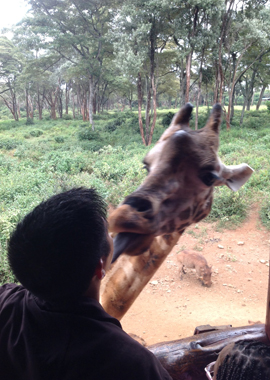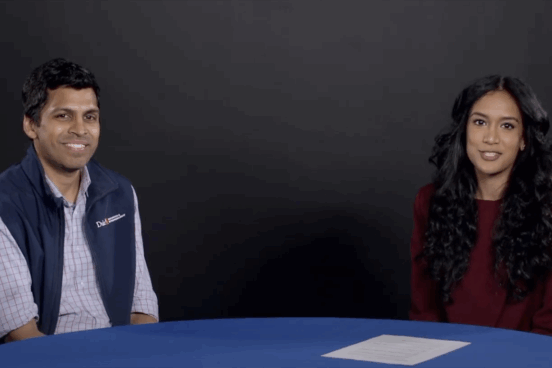Duke Daytime MBA Student Blog

A Very International MBA Experience

What do China, Kenya, Tanzania, Chile, and Mexico all have in common? They’ve all been a part of my experience at business school. Fuqua has long billed itself as an international business program, but I wasn’t prepared for how international it really is. To start with, nearly 40% of my class hails from places as far away as Taiwan, Nepal, and Columbia. These students have enriched classroom discussions and have shared their culture and food with me in their homes, at Fuqua’s Around the World Dinners, and during Fuqua Fridays.
Fuqua also does a great job of building international experiences into its curriculum. As a first-year student, I participated in the Global Academic Travel Experience (GATE) to China. During Spring Term 2, I studied Chinese culture and business practices in class and then visited Beijing, Chongqing, Guangzhou, and Shanghai after the term concluded. Not only did I see the Great Wall and Tiananmen Square, but I also met with leaders at Proctor & Gamble, the National Basketball Association (U.S. basketball is huge in China), and McDonald’s to discuss their experiences of doing business in the region.
And this year, I did an exchange program in at Pontifical Catholic University in Santiago, Chile during Spring Term 1. I took classes in Negotiations and Global Marketing with both locals and Fuqua classmates. I chose Santiago because of the warm climate, renowned wine and opportunity to improve my Spanish. I was also very excited about the prospect of hiking the Inca Trail after the program concluded. It was the experience of a lifetime.
Outside of the globally focused MBA curriculum and extracurricular programs, I have also found that there are plenty of informal opportunities to experience life abroad. Many Fuquans organize small group trips to their home countries during breaks, and this year alone, some of my friends trekked to Morocco, Israel, and Japan over spring break. I didn’t participate in those trips, but I did climb Pico de Orizaba in Mexico with Duke’s BOLD (Building Outdoor Leaders and Doers) club in January, and hiked the Inca Trail in Peru at the start of spring break.
Interning in Africa
The most surprising global experience I’ve had at Fuqua, was my summer internship. Like about 30% of my classmates, I decided to pursue management consulting for my internship. However, instead of working at a client site in the U.S., I had the opportunity to do social impact consulting in Washington, D.C., Kenya and Tanzania with Accenture’s Development Partnerships (ADP) program.
Few programs exist that allow MBA interns to work on international development abroad and ADP has traditionally recruited from only HBS, Wharton and Johnson. I was selected as the first intern from Fuqua thanks to heavy lobbying by Fuqua alumni at Accenture to open the internship to Fuqua students because the school has distinguished itself as a leader in social enterprise. Although I was nervous about my assignment since I wouldn’t find out where I’d be going until a couple of weeks before my internship, I was open to an adventurous summer and wanted to work on something that would have a positive impact on other people.
For half of the summer, I worked at a major international development bank in D.C. on a strategy project to address youth unemployment. My team developed a strategy and identified coalition partners to implement programs that would train and put young people to work in developing countries. I enjoyed the experience a lot, and my work was used in the final report and presentation given to the client in July. After the project concluded, I was assigned to a nutritional strategy project in East Africa. Our client was a U.S. government agency that funded projects addressing malnutrition in East Africa.
Currently, the U.S. and other NGOs fund nearly all of the clinics and supplementary nutritional products given to people who are malnourished in East Africa. In rural villages, where malnutrition is the most pervasive, these clinics and products are a lifeline for people who subsist on grain and whatever else they can scrounge up. But what happens when the money runs out? Our client wanted us to find a solution that would enable people to access these products at a price they could afford for when this happens.
Much of my work was done in the field and I met with leaders from government, the private sector and NGOs to better understand the problem we were facing. But working in an office where the electricity went out frequently and being restricted to our hotels after dark because of crime made the experience more challenging than I had initially thought.
Despite this, I was treated as an equal member of our team and was able to add value. Having worked with team members at Fuqua who were from many different countries, I felt comfortable navigating through the bureaucracy and other challenges that we faced. Moreover, the training I received at Duke was helping me make a big difference in assessing project barriers and developing a solution. After a month of collecting data and putting together an initial set of files, I packed up my things and prepared to return to Durham for my second year at Fuqua.
My experiences at Fuqua have been beyond anything I could have hoped for and increased my desire to experience all that the world has to offer. Prior to business school, I had only traveled around Western Europe following a study abroad program, and I never saw myself hiking a mountain or working in a developing country. But in one year, Fuqua transformed the way I think and provided me with a new appreciation for international cultures and peoples. If you’re looking for an MBA program that provides ample opportunities for a truly international and transformative experience, I can’t personally think of a program that does it better than Duke.



